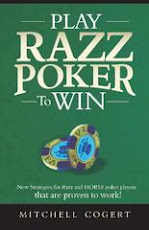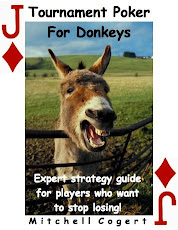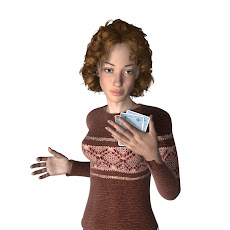Guest post from Mark who runs the Poker Bankroll Blog and the PokerBRB.com freeroll and tournament league follows:

Lately I have come to realize that playing Multi-table Poker Tournaments requires a special mental mindset that not all poker players possess. On one hand you never stand to lose more than the tournament buy-in, but the price you pay for this privilege is that most of the tournaments you enter will be a complete waste of time - when evaluated by a profit per hour criteria - unless you make it to the final table.
The path to the final table in a large multi-table tournament is bumpy to say the least. You will be fighting other poker minds and constantly increasing blinds in a race to stay ahead of the field while avoiding dangerous situations that could turn your chances of winning upside down in a heartbeat.
Multi-table tournaments are my favorite poker game, but it’s definitely a love/hate relationship. I like them because a small buy-in gives me a chance of winning big and unlike entering a lottery I can influence my chances of winning. I hate them when I play perfect, patient poker for 4 hours only to get knocked out in 30th place in some all-in situation where I am a massive favorite, but the chip leader at the table sucks out on me.
The last couple of days I have been wondering whether a change of my overall approach to multi-table tournaments could somehow minimize some of the frustrations I often experience when playing them. My usual tournament approach is to enter into many pots during the first hour when the blinds are low, hoping to catch a monster flop that will double me up. If I manage to make it to the first break with a solid stack I start playing my opponents more; aiming to win some pots by outplaying them. If I don’t have a solid stack after the first break I narrow down my hand range selection and play my decent hands aggressively. With this overall strategy I don’t have problems making the money, but my final table participation percentage is miserably low.
Ways to Approach Tournament Play
I think my biggest problem is that I often find myself below average stacked after the first couple of hours of play which really limits the possibilities one haves to accumulate chips. Basically my tournament becomes a folding game with sporadic bursts of aggression when a decent hand comes along. Of course if I become seriously short-stacked I will push with almost any hand if I’m first to act. Sometimes I get lucky catching a good series of cards, pushing, getting called by inferior hands and doubling up a couple of times putting me back in the running. However, an average or slightly above average stack is really vulnerable in the late stages of a tournament where the blinds are high and people push all-in preflop in each round.
The way I have been playing tournaments so far has resulted in most of my all-in situations being concentrated at the end of the tournament. Seeing as the all-in situations are the ones where you risk exiting the tournament it therefore makes sense that I will often experience being knocked out late in tournaments.
Now what will happen if I turn my game around so that most of my all-in situations are concentrated earlier on? I will be knocked out earlier more often that’s for sure. However, if I survive the early onslaught my above average stack will give me a higher degree of freedom to operate during the later stages of the tournament. I will be able to make moves on my opponents, I will survive bad beats and I will be able to wait for solid hands during the all-in frenzy that starts after the bubble bursts. In addition I will avoid the frustration of mostly being knocked out ITM but before the prizes become significant.
Another benefit of the strategy outlined above is that I will be accumulating chips at a stage where the average opposition is of a lower quality and have a big chip stack later when the average opposition is of a higher quality and therefore more susceptible to folding hands when I make moves on them.
I would really appreciate some comments on my thoughts in this article.
About the author
Mark runs the Poker Bankroll Blog and the PokerBRB.com freeroll and tournament league.
The Poker Bankroll Blog is full of articles on poker tournament strategy written by him and guest authors. There are articles for every level of poker player. The PokerBRB freeroll and tournament league is a free to join poker league where they host monthly competitions with freerolls and tournaments. Each freeroll and tournament in the PokerBRB freeroll league counts towards their monthly leaderboard. The top 20 on each monthly leaderboard gets invited to their exclusive monthly finals.









